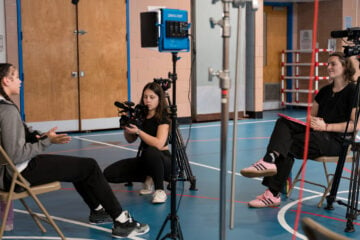WSHU’s ‘Still Newtown’ podcast reflects on Sandy Hook 10 years later

Catherine Violet Hubbard Animal Sanctuary
Davis Dunavin, host of WSHU's "Still Newtown," interviews Jenny Hubbard, founder of the Catherine Violet Hubbard Animal Sanctuary. Hubbard created the sanctuary in honor of her daughter, who was killed in the Sandy Hook shooting.
WSHU in Fairfield, Conn., could have covered the 10-year anniversary of the shooting at Sandy Hook Elementary School in a number of ways. The station’s team decided on a narrative podcast, which as host Davis Dunavin put it, allowed them to “tell the bigger story” about how the shooting has — and has not — changed the community where it happened.
Still Newtown is an 11-episode podcast reported and narrated by Dunavin, who covered the Sandy Hook shooting in 2012 as a reporter for Patch.com. Now a reporter at WSHU, he’s continued to build sources in the community over the past decade. Those connections served as the basis for his reporting in the series.
“It seemed to us that a narrative podcast let us tell one big story, including all of those voices and really making sure that we heard from as many people as we could,” Dunavin said.
Still Newton’s 11 episodes range from 10 to 30 minutes and include a mix of Dunavin’s narration and his interviews with Sandy Hook survivors, parents who lost their children that day and Newtown community leaders. All 11 episodes were released at once Monday.
Episodes cover how students who were in elementary school at the time of the shooting are now high-school and college-aged activists against gun violence, how therapists helped the school come back together after the shooting, and the traditions that carry on in Newtown.
Dunavin said he originally conceived the series as a look at how Newtown had changed in the past decade. But after his first few interviews, he decided that the podcast’s main theme would be the story of a resilient town, rather than one that had reinvented itself.
“The story was one of a town holding together and being strong and finding kindness,” Dunavin said. ”This is not the story of every single person in the town or every person affected by the shooting, but the story that we found from the people that we spoke to … one of continuing to grow and live and, in many cases, find some kind of healing.”
Getting the timing right
Conversations about the series began in October 2021, and most of the interviews took place from May through July of this year, said Terry Sheridan, WSHU’s director of news and education.
The station knew that there would be a lot of media interest in the Sandy Hook anniversary and was intentional about its work to get ahead of that coverage and not burden survivors and their families with any additional trauma around the Dec. 14 date.
“We didn’t want to wait until everyone else was planning on their coverage a month or a week before,” Sheridan said. “If everybody is doing something or if everyone’s descending upon this town with the message, then the message will be diluted.”
Though Dunavin had built relationships with the people he interviewed for the series, he and the team sought guidance from the Dart Center for Journalism and Trauma at Columbia University on how to interview trauma survivors and cover anniversaries in a respectful way.
WSHU also worked with The Newtown Bee, the town’s weekly newspaper, to connect with sources and do what Sheridan described as a “gut check” to make sure the shooting and its aftermath were captured fairly.
Dunavin said the newspaper’s staff also helped connect him with a community reader, who reviewed episode scripts to make sure they represented the community fairly and accurately.
“I’ve never lived in Newtown, even though I reported there daily,” Dunavin said. “But I knew the town enough to know that like any small town, it’s got its own way of speaking about and thinking about its story. And I didn’t want to tell the story from purely an outsider’s point of view.”
The shooting at Robb Elementary School in Uvalde, Texas, happened while Dunavin was doing interviews for the podcast. He talked with Sandy Hook survivors about how the news affected them and covered a vigil that Newtown held for the Uvalde victims.
The shooting also prompted Dunavin to contact former WSHU news director Dan Katz, who is now news director at Texas Public Radio and had the unique perspective of overseeing coverage of two school shootings. Episode eight of Still Newtown focuses on media coverage of mass shootings and features an interview with Katz.
WSHU received a $4,750 grant from Connecticut Humanities for Still Newtown, marking the first time that the organization funded a podcast. The funds were used to cover the cost of hiring Colorado Public Radio’s Jon Pinnow as a freelance sound designer for the series. The grant was the only outside funding source for the series, Sheridan said.
“We made a conscious decision that we were not going to sell underwriting for the podcast … and, in fact, we turned some down,” Sheridan said. “We did not want to be seen to be making money off of it, but we still have production costs. We went to Connecticut Humanities because we were covering some of the same issues in Connecticut life that they care about.”
Being intentional
WSHU has produced limited-run podcasts before — the series Everytown, about immigration, and Higher Ground, about climate change. However, Sheridan said that neither had the scope or the scale of Still Newtown, and he wanted the production and marketing to reflect that.
Sheridan said WSHU hopes the series will feel relevant to both the Newtown community and a broader national audience. To that end, a freelance publicist the station hired secured an interview for Dunavin on NPR’s 1A and features on All Things Considered and Weekend Edition Sunday. The station also worked to secure high-profile placement for Still Newtown on the NPR One app.
“I think the biggest thing that we learned from the other podcasts was to be very intentional about what we want to do and how we want to do it,” Sheridan said. “Let’s bring in freelancers or whatever we needed to make sure that Davis had the resources to do the podcast. And then once the podcast is done, let’s make sure that people listen to it.”
Sheridan said that the series received 35,000 downloads in its first two days and feedback has been mostly positive so far. Several of Dunavin’s interviewees told him they felt their stories were portrayed fairly and accurately.
“You’re never going to make everybody happy, especially in a project that’s extraordinarily sensitive,” Dunavin said. “But I’m getting the sense that we’ve done right by the people most affected, which was very important to me. And so from those who shared their voices with us, I’ve heard good things.”





